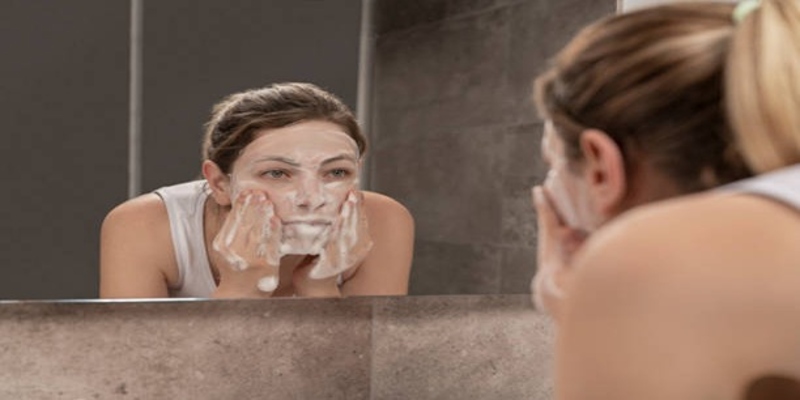Lathering Up: Is Washing Your Face in the Shower Safe?
Mar 04, 2024 By Nancy Miller
The question of whether it's safe to wash your face in the shower has sparked debate among skincare enthusiasts and experts alike. It's a practice many of us engage in without second thought, aiming to streamline our morning or nighttime routines. Yet, concerns have been raised regarding the potential harm this habit could cause to the delicate skin on our faces. Factors such as water temperature, water pressure, and the type of cleanser used come into play and may impact the skin's health and appearance. This article explores the intricacies of washing your face in the shower, examining the potential benefits and drawbacks, and offers insights from skincare professionals to help you make an informed decision about your own skincare routine.
The Impact of Water Temperature on Facial Skin:

One of the critical factors in the debate about washing your face in the shower is the impact of water temperature on facial skin. Hot water, often used in showers for its relaxing properties, can strip the skin of its natural oils, leading to dryness, irritation, and an increase in sensitivity. Conversely, cold water, while refreshing, may not effectively remove dirt and makeup. Skincare experts advocate for lukewarm water as the goldilocks temperature for facial cleansing, balancing efficacy in cleansing with the preservation of the skin's natural barrier.
This recommendation aligns with the skin's need for gentle treatment, considering its exposure to various external stressors daily. Understanding the significance of water temperature can greatly influence the health and appearance of the skin, encouraging individuals to make mindful choices in their skincare practices.
Understanding Water Pressure and Skin Health:
While water temperature is a well-known factor in skincare, water pressure is often overlooked. In the shower, water pressure can be quite strong, leading to an aggressive cleansing experience that may cause damage to the skin's surface. Vigorous scrubbing with harsh cleansers under high-pressure water can disrupt the skin barrier and lead to inflammation and redness. This is particularly concerning for those with sensitive skin or conditions such as eczema or rosacea. Skincare professionals often recommend using gentle, low-pressure water to cleanse the face, allowing for a thorough yet delicate cleansing experience that won't harm the skin.
Choosing the Right Facial Cleanser for Shower Use:
Cream Cleanser:
When it comes to choosing a facial cleanser for shower use, there is no one-size-fits-all solution. However, certain types of cleansers may be better suited for use in the shower than others. A cream cleanser, for example, can provide additional hydration and nourishment to counteract the potential drying effects of hot water. It's important to look for cream cleansers that are also non-comedogenic, meaning they won't clog pores and contribute to breakouts.
Gel Cleanser:
On the other hand, gel cleansers may be more suitable for use in the shower due to their lightweight and refreshing nature. They can effectively remove dirt, oil, and makeup without leaving a heavy residue on the skin, making them a great option for those with oily or acne-prone skin. Gel cleansers also work well in conjunction with lukewarm water to maintain the skin's natural moisture balance.
Micellar Water:
Lastly, micellar water is another popular choice for shower use as it offers a quick and convenient way to cleanse the face without requiring rinsing. It's gentle enough for all skin types and can be applied with a cotton pad before or after showering to remove impurities and refresh the skin.
Tips for Protecting Your Skin:
- Avoid using harsh exfoliants or scrubs in the shower, as they can be too abrasive for delicate facial skin.
- Apply moisturizer immediately after washing your face to lock in hydration and counteract any potential drying effects from the shower.
- Consider investing in a water filter for your shower to remove chemicals and impurities that may be harmful to the skin.
- Use a soft, clean towel to pat your face dry after showering, rather than rubbing, which can cause irritation.
- Always cleanse your face before entering the shower to prevent any leftover makeup or dirt from mixing with shower water and potentially causing clogged pores or breakouts.
The Pros and Cons of In-Shower Face Washing:
Pros:
- Saves time and streamlines skincare routine
- Allows for multi-tasking while cleansing (e.g. shaving legs)
- Warm water can open pores and make cleansing more effective
Cons:
- Hot water can strip skin of natural oils and lead to dryness
- Water pressure may be too strong for delicate facial skin
- Risk of mixing leftover makeup or dirt with shower water and causing clogged pores or breakouts
- May not allow for proper exfoliation or use of specialized face masks or treatments
Alternatives to Washing Your Face in the Shower:

For those concerned with the potential drawbacks of washing their face in the shower, alternatives do exist. Consider cleansing your face at the sink with lukewarm water and a gentle cleanser suited to your skin type. This method allows for more controlled water temperature and pressure, ensuring a gentler cleansing experience. Additionally, using a face wipe or micellar water can provide a quick and effective cleanse for those times when you're unable to wash your face traditionally. Micellar water, in particular, is designed to capture and lift away dirt and makeup without the need for rinsing, making it an excellent option for sensitive or irritated skin. Ultimately, the key lies in understanding your skin's unique needs and adjusting your cleansing routine accordingly.
Conclusion:
The act of washing your face in the shower can have both positive and negative effects on your skin. While it may save time and provide a relaxing experience, hot water and high water pressure can be damaging to facial skin. By understanding the impact of water temperature and pressure on the skin, individuals can make informed decisions about their skincare routine and choose appropriate products for shower use. Whether you choose to cleanse your face in the shower or at the sink, always prioritize gentle treatment and be mindful of your skin's needs for optimal health and appearance. With these tips in mind, you can confidently incorporate facial cleansing into your shower routine while keeping your skin happy and healthy.








